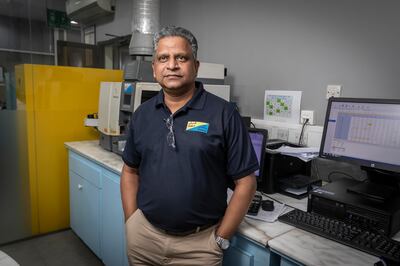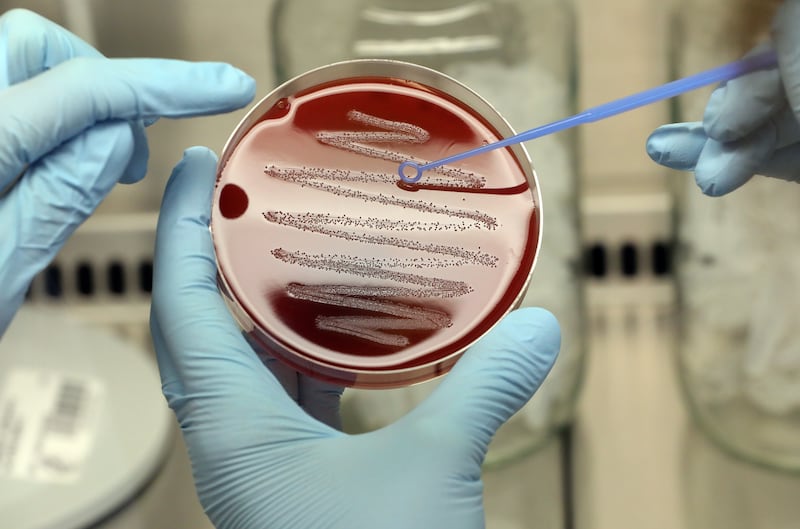A rare suspected case of Legionnaires' disease at a rented villa in Dubai has raised concerns about the risks of bacterial infections from neglected water tanks and air conditioning systems.
Despite strict guidelines from Dubai Municipality on the demands of private landlords, letting agents and commercial properties to regularly maintain units, vacant buildings are more vulnerable to life-threatening bacteria developing.
A woman who recently moved to Dubai reported the incident on social media after her husband became seriously ill with severe flu-like symptoms, resulting in a week in hospital and intensive care.
Legionella and other bacteria were recovered from test samples, she said.
Although rare, the presence of bacteria in water tanks or AC units left uncleaned can pose serious health risks.
“Some fungal infections can be caused by poorly maintained air conditioning systems and water tanks, with Legionnaires’ disease one example of this,” said Dr Kartik Sood, a pulmonologist at NMC Speciality Hospital in Dubai's Al Nahda.
“Most patients we see with this come in with an increase in asthma or asthma-like symptoms, because of dust which has accumulated when AC systems are not cleaned correctly.
“If regular cleaning is not happening, then people come in with respiratory problems and different kinds of infections like fungal and bacterial legionella itself.”
Life-threatening infections
When patients present with a high temperature or fever, alongside chest pain or tightness, doctors apply further tests to determine the cause and the presence of a potential bacterial infection.
Such illnesses can usually be treated easily with fluoroquinolone, a drug used to fight bacterial infections, including bronchitis, pneumonia and septicaemia.
“If patients already have diseases like cardiac disease or respiratory chronic obstructive pulmonary disease, or asthma, Legionnaires’ disease can sometimes be life-threatening,” said Dr Sood.
“We see cases from mild up to severe, or very severe types.

“If children present late to us and the diagnosis is not done quickly, it can become very dangerous.”
Unclean water tanks serve as a breeding ground for dirt, dust, debris, mould and harmful bacteria, including legionella, exposing the environment to potential contamination.
Bacteria can also be carried by air conditioners that use water-cooling systems. If there is a leak in the central system and it contains spores, tiny water droplets carrying the bacteria can spread.
Dubai Municipality recommends regular water-quality
ing and assessments, with swimming pool water also tested every two months.
"We advise adhering to Dubai Municipality's recommended water-hygiene standards by cleaning and disinfecting your water tank and pipeline systems at least twice a year,” said Hisham Jaber, co-founder of The Healthy Home, a Dubai firm that carries out regular call-outs for sanitising treatment to combat unhealthy bacteria.

“This practice helps mitigate the risk of bacteria, such as legionella, and avoids negative impact on health and overall well-being.
“Maintaining clean and safe water is vital for personal hygiene, showering, cooking and drinking.”
From October 2016 to June 2017, 65 cases of Legionnaires’ disease – the result of Legionella bacteria – were reported among European residents who had recently travelled to Dubai.
Experts at the European Centre for Disease Prevention and Control were unable to clarify if travellers had been exposed to the bacteria while in the UAE, or while passing through from other countries due to Dubai’s location as a key transit hub for air travel.
Changing seasons
Christopher Rajamani, deputy general manager at Al Hoty-Stanger Laboratories, one of the UAE’s leading private testing centres, said the bacteria were more likely to be found during a seasonal change.
“Whenever we move from the summer to winter, or from winter to summer, the following 15 to 30 days are critical,” he said.
“Chlorine treatment regimes [in swimming pools] need to change according to the season.
“As the temperature rises, you need to increase the dosage of chlorine in the water, according to Dubai Municipality guidelines.
“We have not seen any results to a level where it causes concern, but we do have positive results and that's why we test.”
Mr Rajamani said 95 per cent of the work undertaken by the lab is for regular commercial testing, but the rest of the sampling is in response to illness or concerns over poor-quality water systems.
“It is only a problem when people are ignorant, or due to low occupancy and a hotel may close a floor, for example,” he said.
“Then they need to flush the water once it reopens to get in fresh supplies containing enough residual chlorine.
“That should usually take care of any bacteria in terms of legionella, or other microbiology."
Mr Rajamani said people who are travelling for long periods, and spend a lot of time in hotels and airports, are more susceptible to illness because of this.
“And if you’re immunocompromised, over 60 or under 12, if you have weak lungs or you're a heavy smoker, for example, it can hit you hard.”







